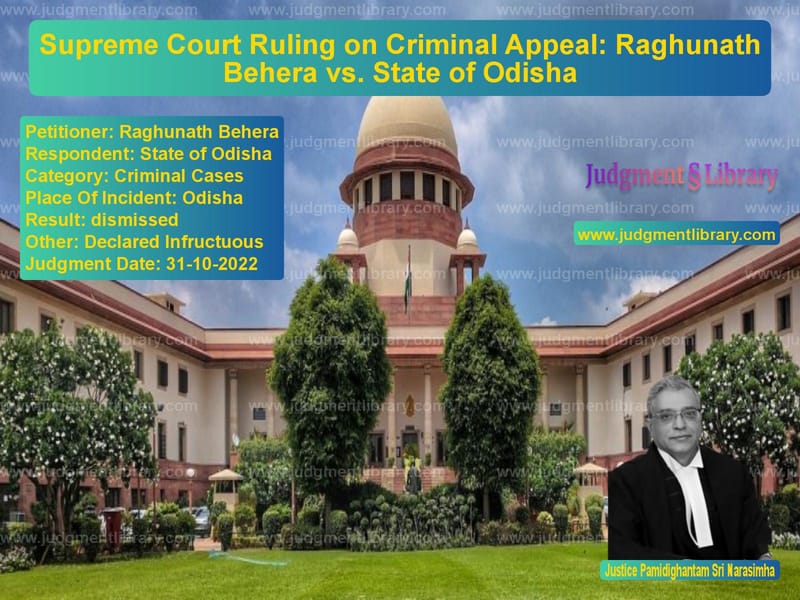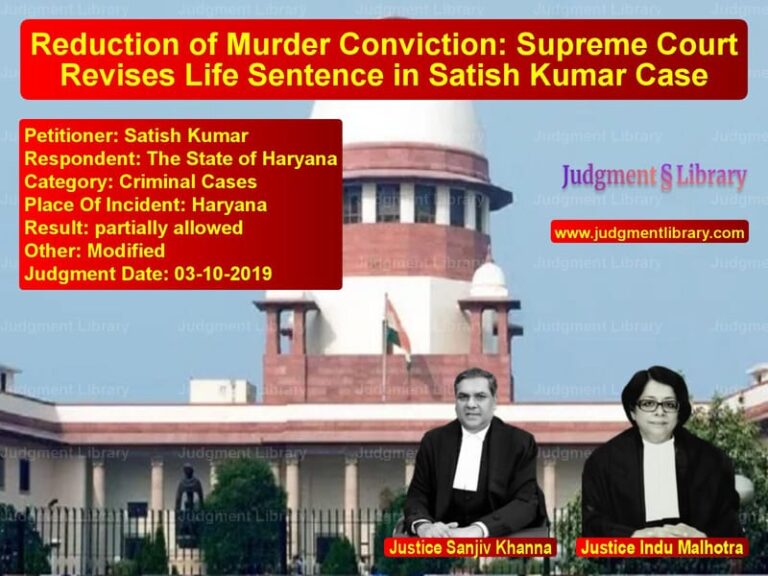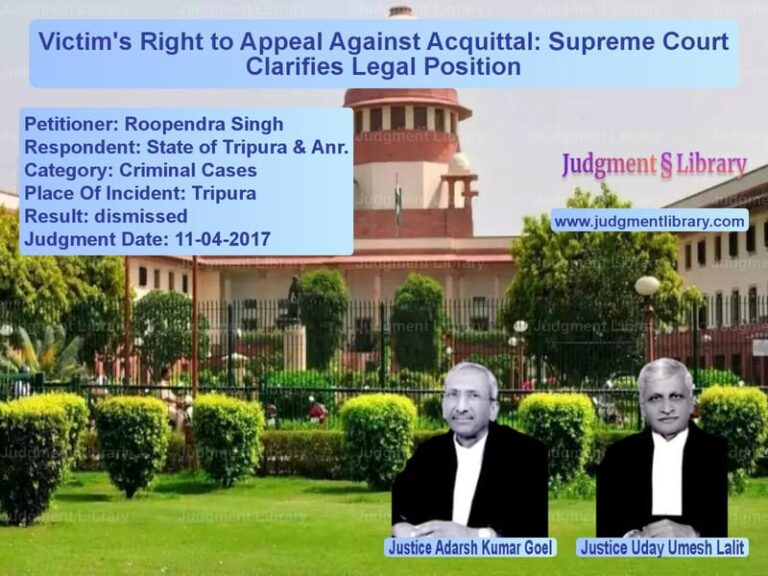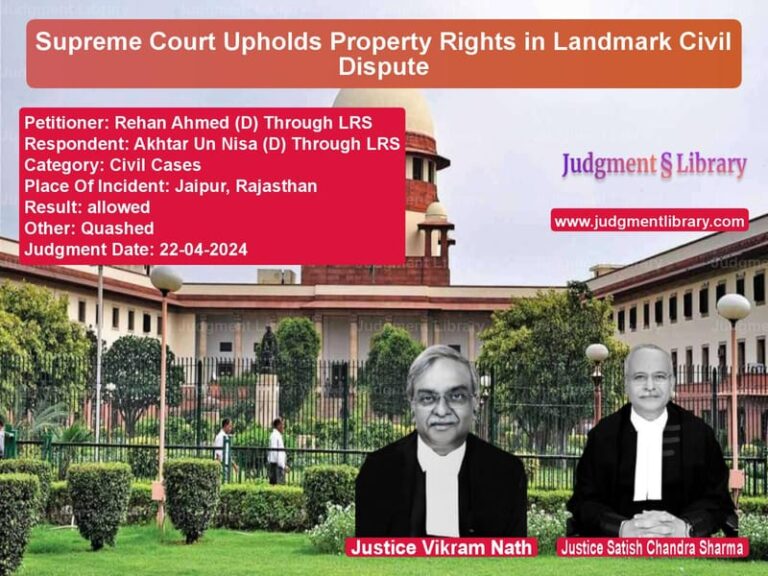Supreme Court Ruling on Criminal Appeal: Raghunath Behera vs. State of Odisha
The case of Raghunath Behera vs. State of Odisha is a significant criminal appeal before the Supreme Court of India. The petitioner, Raghunath Behera, challenged his conviction and sentencing under various sections of the Indian Penal Code (IPC). The appeal raised fundamental questions about procedural lapses, evidentiary sufficiency, and judicial compliance in criminal trials.
The appeal was considered under multiple diary numbers from 2020 to 2022. The Court had to determine whether procedural defects in the filing of the appeal could result in an automatic dismissal or whether the appellant should be granted more time to rectify errors.
Background of the Case
The petitioner was convicted by the Trial Court in Odisha and sentenced to imprisonment for offenses under the IPC. He filed an appeal in the High Court, which upheld the conviction. The petitioner then approached the Supreme Court, arguing that his conviction was based on weak evidence and procedural irregularities.
Key Legal Issues
The case revolved around the following key legal questions:
- Did the Trial Court and the High Court err in convicting the petitioner despite the lack of conclusive evidence?
- Was there procedural non-compliance that affected the fairness of the trial?
- Should the Supreme Court grant additional time for the rectification of procedural defects in filing the appeal?
Arguments by the Petitioner (Raghunath Behera)
The petitioner, through his counsel, presented the following arguments:
- The conviction was based on insufficient and circumstantial evidence, which did not establish guilt beyond a reasonable doubt.
- Key prosecution witnesses had turned hostile during the trial, weakening the case against the accused.
- The Trial Court failed to consider inconsistencies in witness statements and forensic reports.
- Procedural lapses occurred during the trial, including delays in framing charges and improper examination of evidence.
- The petitioner had filed his appeal within the prescribed time, but minor defects in documentation were cited as a reason for dismissal.
- The Supreme Court should exercise its discretion to allow rectification of defects rather than dismiss the appeal outright.
Arguments by the Respondent (State of Odisha)
The State of Odisha, representing the prosecution, countered the petitioner’s claims with the following arguments:
- The prosecution had presented strong and corroborative evidence that clearly established the petitioner’s guilt.
- Witness statements, forensic reports, and circumstantial evidence supported the conviction.
- The petitioner had multiple opportunities to rectify procedural defects but failed to comply with court directions.
- The High Court had already examined and upheld the Trial Court’s findings, and there was no fresh ground to warrant interference by the Supreme Court.
- The judiciary must enforce strict procedural compliance to ensure efficiency in the legal system and avoid unnecessary delays in criminal appeals.
Supreme Court’s Observations
Justice Pamidighantam Sri Narasimha, while delivering the judgment, made the following key observations:
“As a last opportunity, further eight weeks time is granted for curing the defects as notified by the Registry, failing which the matters shall stand dismissed without any further reference to the Court.”
This highlighted the procedural aspect that several appeals had been pending due to defects in filing. The Court stressed that while some leniency could be granted for rectification, repeated failure to comply would result in automatic dismissal.
Read also: https://judgmentlibrary.com/supreme-court-restores-conviction-in-jharkhand-rape-and-murder-case/
The judgment further stated:
“The Court cannot allow procedural laxity to affect the efficiency of the legal system. At the same time, fair trial principles demand that technicalities should not defeat the rights of an accused to a proper appeal.”
Judgment Outcome
The Supreme Court ruled as follows:
- For some petitioners who failed to rectify defects within the prescribed time, the appeals were dismissed.
- For those who sought permission to withdraw their petitions, the Court allowed the withdrawal, stating: “Learned Counsel appearing for the petitioner(s)/appellant(s) seek permission to withdraw these matters. Permission is granted. These matters stand dismissed as withdrawn.”
- For those who showed reasonable cause for delay in rectifying defects, the Court granted an additional eight weeks to comply.
Key Takeaways from the Judgment
- Procedural compliance is essential, and courts will not entertain repeated non-compliance with filing requirements.
- While technicalities should not override substantive justice, failure to meet procedural deadlines can result in dismissal.
- The judiciary has a duty to balance procedural efficiency with the right to appeal.
- The ruling reinforces that criminal appeals must be supported by strong evidence and compliance with legal norms.
Conclusion
The Supreme Court’s judgment in this case underscores the importance of both procedural discipline and substantive justice in criminal appeals. While the Court provided an opportunity for some petitioners to rectify defects, it also took a firm stance against repeated non-compliance. The case sets a precedent for future criminal appeals, emphasizing that procedural obligations cannot be overlooked, but at the same time, justice must not be denied due to technical lapses.
Petitioner Name: Raghunath Behera.Respondent Name: State of Odisha.Judgment By: Justice Pamidighantam Sri Narasimha.Place Of Incident: Odisha.Judgment Date: 31-10-2022.
Don’t miss out on the full details! Download the complete judgment in PDF format below and gain valuable insights instantly!
Download Judgment: raghunath-behera-vs-state-of-odisha-supreme-court-of-india-judgment-dated-31-10-2022.pdf
Directly Download Judgment: Directly download this Judgment
See all petitions in Bail and Anticipatory Bail
See all petitions in Fraud and Forgery
See all petitions in Custodial Deaths and Police Misconduct
See all petitions in Judgment by P.S. Narasimha
See all petitions in dismissed
See all petitions in Declared Infructuous
See all petitions in supreme court of India judgments October 2022
See all petitions in 2022 judgments
See all posts in Criminal Cases Category
See all allowed petitions in Criminal Cases Category
See all Dismissed petitions in Criminal Cases Category
See all partially allowed petitions in Criminal Cases Category







